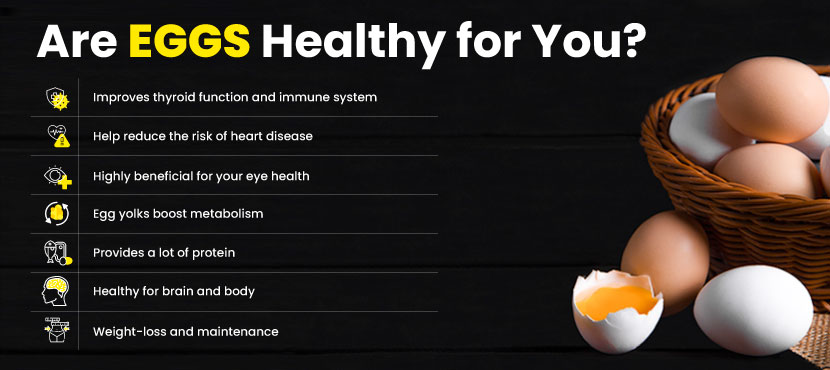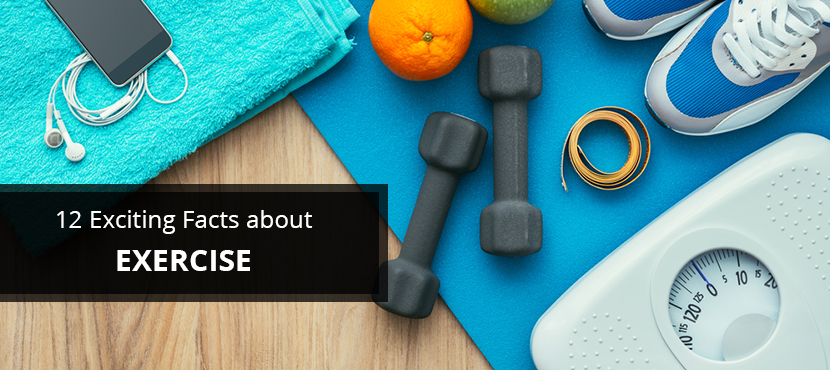Are Eggs Healthy for You?
Eggs are, without a doubt, one of the most nutritious foods that are readily available to all. You can prepare eggs dishes in a variety of ways, with some requiring little to no work. Whether you like scrambled eggs, sunny side up, or break a few in your hot soup, there are multiple health benefits of eating eggs.
Benefits of eggs
There are many benefits of eggs and your mom must have asked you to eat eggs regularly. If you play any sports, even your sports coach and nutrition expert would have emphasized on eggs’ benefits.
- Help reduce the risk of heart disease– Amongst many health benefits of eating eggs, keeping your heart healthy is a primary one. Studies suggest that eggs are affordable, rich in protein and micronutrients (One large egg contains 187 mg of good cholesterol, HDL), nutrient-dense and low in saturated fatty acids.
- Highly beneficial for your eye health– Eggs have powerful antioxidants that have the ability to protect your eyes from deterioration caused by aging. Lutein and zeaxanthin are the names of these antioxidants. They fight off the deteriorating processes that could damage your vision. These antioxidants are found in egg yolks, and once you eat them, your retina begins to store them, protecting you from conditions like macular degeneration and cataracts. Vitamin A deficiency is one of the leading causes of blindness, and eggs are a good source of this vitamin.
- Egg yolks boost metabolism– The yellow portion of the egg, or the yolk, contains a substance called choline. 145 milligrams of choline, or more than a quarter of the recommended daily intake of 550 mg, are found in a single large egg. It is interesting to note that research also shows that increasing choline intake can help female athletes lose weight and considerably speed up metabolism.
- Provides a lot of protein– Most people are aware that eggs are a reliable source of protein. For those who are overweight, a diet heavy in protein can help them lose a lot of weight. One big egg has approximately 6 grams of high-quality protein, which makes it a great option for anyone trying to maintain their weight.
The addition of eggs to your diet increases your daily protein consumption, nourishes and restores your body, and keeps you fuller for longer. Eggs also boost your energy levels, enabling you to accomplish more in a shorter amount of time.
- Healthy for brain and body– As was already mentioned, eggs are a good source of choline, a vitamin crucial for brain development. Pregnant women are advised by nutritionists to include eggs in their prenatal diet to increase the absorption of vital nutrients. The choline in eggs is extremely beneficial to young children’s brain development.
Eggs also include lutein, a vitamin that is excellent for the body and brain. The vitamin, which is found in the brain, improves children’s and adults’ mental and cognitive capacities.
- Improves thyroid function and immune system– Eggs are a good source of the vitamins A, B-12, iodine, and selenium that our bodies need to synthesize thyroid hormones. The thyroid hormones are essential for controlling body weight because they speed up metabolism. As a result, these elements in eggs can improve thyroid performance and aid in weight loss.
- T– Due to the protein in eggs, one may feel fuller for longer. This can cut a person’s overall calorie consumption and decrease the impulse to eat. Gaining weight and stress go hand in hand. It is more likely for those with mental illnesses like depression and anxiety to have weight gain. Eggs include choline, which helps improve memory, mood, muscle control, and other mental processes. Therefore, eating eggs may help you manage your mood, which may then speed up your metabolism and promote weight loss.
Nutrition
According to the United States Department of Agriculture (USDA), one medium boiled or poached egg weighing 44 g can provide the following nutrients:
Energy: 62.5 calories
Protein 5.5 grams (g)
Total fat: 4.2 g, of which 1.4 g are saturated
Sodium: 189 milligrams (mg)
Calcium: 24.6 mg
Iron: 0.8 mg
Magnesium 5.3 mg
Phosphorus: 86.7 mg
Potassium: 60.3 mg
Zinc: 0.6 mg
Cholesterol: 162 mg
Selenium: 13.4 micrograms (mcg)
Lutein and zeaxanthin: 220 mcg
Folate: 15.4 mcg
Fats
About 4.2 g of fat, of which 1.4 g are saturated, make up one medium egg. Eggs contain mostly unsaturated fat. This type of fat is regarded as the best for a balanced diet by experts.
Total fat should make up 25–35% of a person’s daily calories, and saturated fat should constitute less than 10%. Thus, a person who consumes 2,000 calories per day should limit their intake of saturated fat to a maximum of 22 g.
Omega-3 fatty acids
Omega-3 fatty acids are also present in eggs, primarily in the form of docosahexaenoic acid (DHA). DHA supports healthy vision and cognitive function.
Vitamin D
Low levels of vitamin D, an essential mineral, can cause weak or brittle bones. This vitamin is present in eggs naturally, and some are supplemented with vitamin D in the hens’ feed. The majority of the vitamin D that the body requires is synthesized by sunlight. However, dietary sources of vitamin D are also necessary for people.
Cholesterol
Eating eggs seems to lower levels of LDL cholesterol and raise levels of HDL (the good cholesterol). Eggs are also low in saturated fat. Their impact on blood cholesterol levels will therefore probably be clinically minimal.
Can I eat eggs every day?
Eggs contain fats, Omega-3 fatty acids, vitamin D, vitamin A, good cholesterol HDL, proteins and many other nutrients. There are many health benefits of eating eggs every day, especially during breakfast will keep most of your body parts healthy.
Are eggs good for losing weight?
As we have discussed above, eggs help in losing weight. However, do not use too much oil while cooking it. It is one of the most nutritious foods available abundantly on the face of earth. Most people eat chicken eggs, however you might even eat quail and duck eggs.
Among eggs’ benefits, they can help you burn more calories by boosting your metabolism, which will keep your weight in check. One large egg has about 80 calories. Consuming eggs results in steady blood sugar levels and an insulin response. Egg consumption reduces ghrelin, the hormone that makes you feel hungry, making you feel fuller for longer durations.
How to select and store eggs?
If at all feasible, choose eggs from free-range or organically raised chickens. Try to find eggs that come from birds which were not fed unnatural diets with steroids and other drugs. These birds produce eggs with increased levels of vitamin D. Ensure that none of the eggs in the carton are broken before buying, and then keep them in the refrigerator for up to a month. Consume your eggs within two to three days if you are not keeping them refrigerated; otherwise, they will deteriorate.









